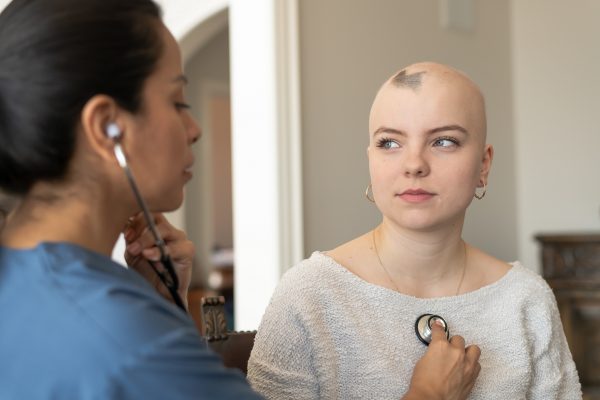
Patients with haematologic malignancy (HM) infected by COVID-19 display hospitalisation rates higher than 50% and fatality rates of about 30%. Unfortunately, the immune response to SARS-CoV-2 vaccines is often poor in these patients. In this, the subtype of haematologic malignancy and B cell–depleting treatment predict a poor immune response to vaccination. Haematologic patients with a deficient vaccine response need other protective measures, including pre- and post-exposure prophylaxis.
Patients with haematologic malignancy (HM) have a more severe clinical course of COVID-19 and a higher fatality rate. The hospitalisation rate for these patients is higher than 50%, and the fatality rate is approximately 30%. The most common risk factors for an adverse outcome are, among others and in order of frequency: age, comorbidities, active HM, type of HM, intensive care unit stay, mechanical ventilation, and severe COVID-19.
SARS-CoV-2 viral load is significantly higher in patients with HM than in those without. This seems to apply particularly to those who had received chemotherapy or targeted therapies. Interestingly, patients with solid cancer do not display higher risk of SARS-CoV-2–associated immune dysregulation compared with the general population, while patients with HM show complex immunologic consequences of SARS-CoV-2 exposure. Compared to COVID-19 patients without HM, COVID-19 patients with HM showed significantly decreased percentages of classical monocytes, immune-regulatory natural killer cells, double-positive T cells, and B cells. These patients have a reduced prevalence of pre-existing SARS-CoV-2 cross-reactive CD4+ T-cell responses and signs of T-cell exhaustion compared with patients with solid cancer or healthy volunteers. The lack of T cell responses suggests that patients with HM fail to mount a protective T cell response.
COVID-19 vaccination is particularly recommended in immunocompromised patients. However, there is only limited information on vaccine safety and efficacy for patients with HM. Furthermore, it is important to note that many anticancer therapies are immunosuppressive. In particular, anti-CD20 antibodies, treatment with Bruton’s tyrosine kinase inhibitors, ruxolitinib and venetoclax are associated with strongly reduced or absent antibody responses. Nonetheless, several studies confirmed an improvement of the immune response after a booster dose of COVID-19 vaccine in patients with HM. As the recent SARS-CoV-2 variants of concerns have increased their transmissibility, a first and second booster vaccination should therefore be given to all patients with HM regardless of serologic results.
When comparing different HM subtypes, patients with chronic lymphocytic leukaemia (CLL) and indolent lymphoma had the lowest seroconversion rate after COVID-19 vaccination. The highest seroconversion rates in descending order were reported in patients with smouldering myeloma, hairy cell leukaemia, Hodgkin lymphoma, myelodysplastic syndrome, chronic myeloid leukaemia, myeloproliferative disorders, acute myeloid leukaemia, multiple myeloma, acute lymphoid leukaemia, T-cell lymphoma, and aggressive lymphoma.
Because a large subgroup of patients with HM does not respond adequately to COVID-19 vaccination, early therapeutic or prophylactic measures are needed to prevent severe COVID-19. In terms of the current dominating Omicron variant, the antiviral drugs nirmatrelvir-ritonavir, remdesivir, and molnupiravir retain their efficacy against Omicron compared with earlier variants of concern. Furthermore, also convalescent plasma therapy represents an option for individual patients with HM but should not be applied routinely. Dexamethasone is indicated in the treatment of COVID-19 in adults who require supplemental oxygen therapy. Monoclonal antibodies directed to the S protein can neutralise the ability of the virus to bind and fuse with the target host cell. However, several monoclonal antibodies (etesevimab-bamlanivimab, imdevimab-casirivimab) lose their neutralising activity and are not effective against Omicron. Only the recently authorised monoclonal antibody bebtelovimab could adequately cover all sublineages of the Omicron variant.
For patients with HM, the current SARS-CoV-2 pandemic represents a particular challenge for at least two reasons. First, their immune system may be impaired by the interaction of cancer cells with different immune cell subsets, inducing a state of anergy. Second, the antineoplastic therapies themselves, and in particular anti-CD20 antibodies or chemotherapies, act as potent immunosuppressive agents. Active immunisation by vaccination remains an important element of protection for these patients. However, the vaccine-induced immunity is significantly lower in patients with lymphoid malignancies and patients receiving active B cell-depleting treatment. Antiviral drugs and monoclonal antibodies for early treatment of COVID-19 have become available and should be given to all SARS-CoV-2–infected patients with HM to prevent severe or fatal courses. The treatment selection is based on efficacy against the current dominating SARS-CoV-2 variants, potential contraindications, drug interactions, and availability in different health care systems.
Reference